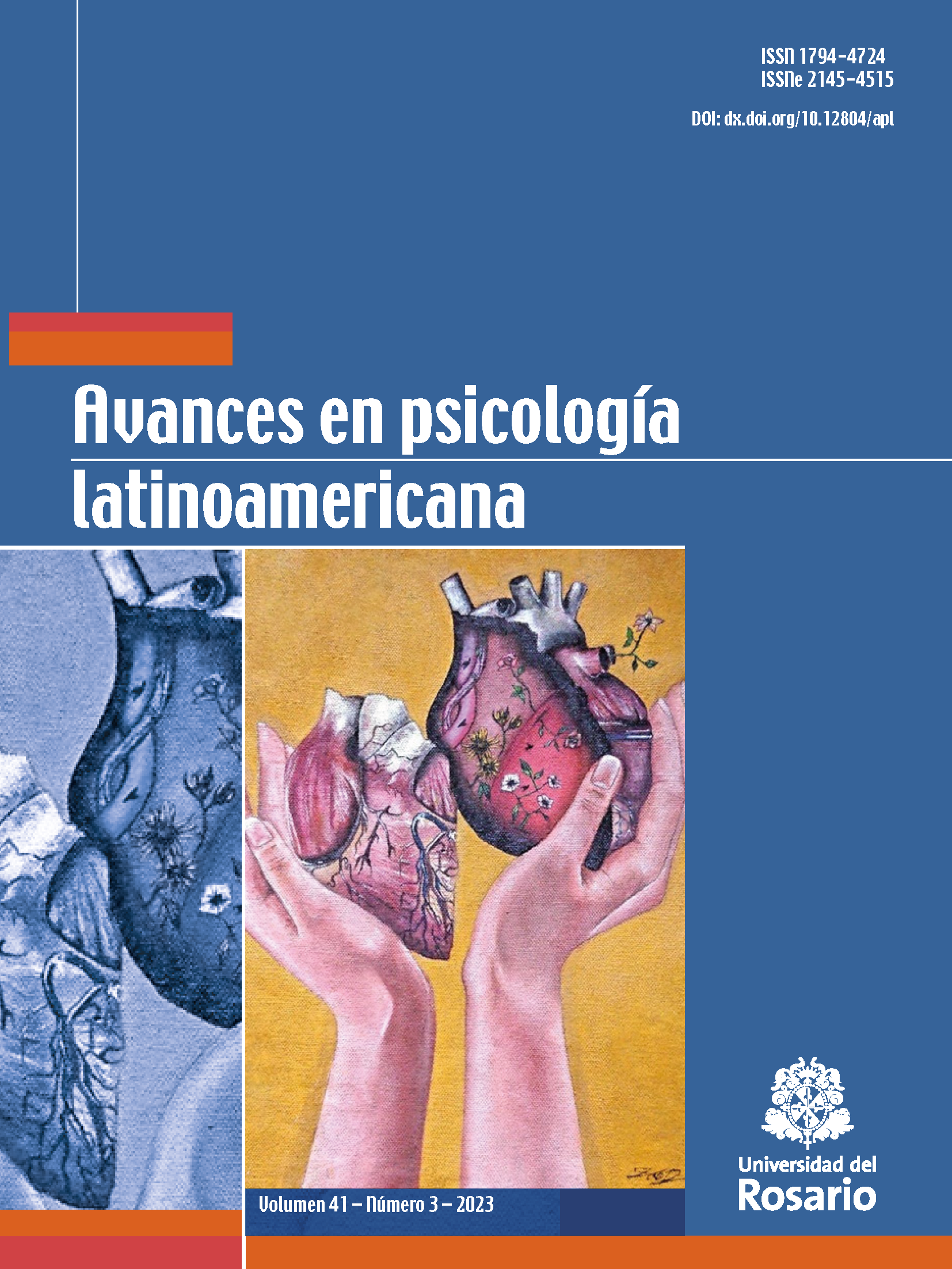Resiliencia, satisfacción con la vida y florecimiento: Mediación de los afectos positivos y negativos en la pandemia COVID-19
Barra lateral del artículo
Contenido principal del artículo
 Jose Roberto Andrade do Nascimento Júnior
Jose Roberto Andrade do Nascimento Júnior
 Josefa Eugenia Tenório Tavares
Josefa Eugenia Tenório Tavares
El COVID-19 ha generado problemas de salud mental, lo que motivó esta investigación. El objetivo es probar el efecto de la resiliencia en la satisfacción con la vida y el florecimiento, mediado por afectos positivos y negativos. Participaron 261 universitarios brasileños, 63,9% eran mujeres, con edad promedio de 24,38 ± 7,44 años. Al comienzo del aislamiento social, respondieron en línea cuestionarios que contenían Escalas de Resiliencia, Satisfacción con la Vida, Afectos y florecimientos positivos y negativos, además de cuestiones sociodemográficas. En el modelo de mediación, los resultados indicaron ajustes suficientemente adecuados [B-Sχ² (328) = 698,28; p = 0,001; B-S $ ² $ / gl = 2,13; CFI = 0,91; TLI = 0,90; RMSEA = 0,066; p (RMSEA <0.05) = 0.001], mostrando un efecto mediador de afecto positivo, lo que corrobora estudios previos, sugiriendo importancia de la resiliencia y emociones positivas durante la pandemia de COVID-19 para mantener la salud mental.
Descargas
Anderson, J. C., & Gerbing, D. W. (1988). Structural equation modeling in practice: A review and recommended two step approach. Psychological Bulletin, 103, 411–423. Accessed at: http://www.personal.psu.edu/jxb14/M554/articles/Anderson&Gerbing1988.pdf
Albuquerque, A. S., & Tróccoli, B. T. (2004). Desenvolvimento de uma escala de bem-estar subjetivo. Psicologia: Teoria e Pesquisa, 20(2), 153-164. http://doi.org/10.1590/S0102-37722004000200008
Becalli, M. S. F. da S. (2014). Caminho para o Florescimento: satisfação com a vida, emoções positivas e otimismo em adultos. Dissertação (Mestrado em Psicologia, Aconselhamento e Psicoterapias, Escola de Psicologia e Ciências da Vida, Universidade Lusófona de Humanidades e Tecnologias). Accessed at: http://hdl.handle.net/10437/6017
Bollen K.A., Stine R.A. (1993). Bootstrapping goodness-of-fit measures in structural equation models. In: Bollen KA, Long JS (Eds.). Testing structural equation models. Sage; Newbury Park, CA (pp. 111–135).
Byrne, B. M. (2013). Structural equation modeling with AMOS: Basic concepts, applications, and programming. Routledge.
Cachón, Z.J.; López, M. I.; San Pedro, V.M.B.; Zagalaz, S.M.L.; & González, G. de M. C. (2020). The Importance of the Phoenix Bird Technique (Resilience) in Teacher Training: CD-RISC Scale Validation. Sustainability, 12, 1002. https://doi.org/10.3390/su12031002
Cao, W., Fang Z., Hou, G., Han, M., Xu, X., Dong, J. & Zheng. J. (2020). The psychological impact of the COVID-19 epidemic on college students in China, Psychiatry Research, 20, 30540-0, 165-1781. https://doi.org/10.1016/j.psychres.2020.112934
Coelho, G. L. de H., Hanel, P. HP., Cavalcanti, T. M., Rezende, A. T., & Gouveia, V. V. (2016). Brief Resilience Scale: Testing its factorial structure and invariance in Brazil. Universitas Psychologica, 15, 2, 397-408. http://doi.org/10.11144/Javeriana.upsyl5-2.brst
Condori, K.O.V. & Martínez, R.A. (2019). Resiliencia como factor determinante para la satisfacción con la vida en estudiantes universitarios. Educación Médica Superior, 33, 3. Accessed at: http://scielo.sld.cu/pdf/ems/v33n3/1561-2902-ems-33-03-e1845.pdf
Diener, E. (2000). Subjective well-being: The science of happiness and a proposal for a national index. American Psychologist, 55 (1), 34-43. http://doi.org/10.1037 / 0003-066X.55.1.34
Diener, E. & Chan, M.Y. (2011) Happy People Live Longer: Subjective Well-Being Contributes to Health and Longevity. Applied Psychology: Health and Well-Being, 3, 1-43. http://dx.doi.org/10.1111/j.1758-0854.2010.01045.x
Diener, E., Emmons, R. A., Larsen, R. J., & Griffin, S. (1985). The Satisfaction With Life Scale. Journal of Personality Assessment, 49, 1, 71–75. Accessed at: https://emmons.faculty.ucdavis.edu/wp-content/uploads/sites/90/2015/08/1985_5-SWLS.pdf
Diener, E., Wirtz, D., Tov, W., Kim-Prieto, C., Choi, D., Oishi, S., & Diener-Biswas, R. (2010). New Well-being Measures: Short Scales to Assess Flourishing and Positive and Negative Feelings. Social Indicators Research, 97, 143–156. http://doi.org/10.1007/s11205-009-9493-y
Fornell, C., Larcker, D.F. (1981). Evaluating structural equation models with unobservable variables and measurement error. Journal of Marketing Research, 18, 1, 39-50. https://doi.org/10.1177/002224378101800104
Fonseca, P. N., Nascimento, B. da S., Barbosa, L. H. G. M., Vione, K. C., & Gouveia, V. V. (2015). Flourishing Scale: Evidence of Its Suitability to the Brazilian Context. Social Inquiry into Well-being. 1 (2), 33-40. https://doi.org/10.13165/SIIW-15-1-2-07
Gouveia, V. V., Milfont, T. L., Fonseca, P. N. & Coelho, J. A. P de M. (2008). Life Satisfaction in Brazil: Testing the Psychometric Properties of the Satisfaction With Life Scale (SWLS) in Five Brazilian Samples. Social Indicators Research, 90, 267–277. https://doi.org/10.1007/s11205-008-9257-0
Gouveia, V. V., Ribeiro, M. G. C., Loureto, G. D. L., Silva Neta., O. F. da, Gouveia, R. S. V., Vila, R. & Freire, S. E. de A. (2019). Scale of Positive and Negative Affects (EAPN-10): Evidence of its psychometric adequacy. Trends in Psychology, 27, 1, 189-203. http://dx.doi.org/10.9788/tp2019.1-14
Hair Jr., J. F., Black, W. C., Babin, B. J., Anderson, R. E., & Tathan, R. L. (2019). Análise multivariada de dados (6ª ed.). Porto Alegre: Bookman.
Hu, L., & Bentler, P. M. (1999). Cutoff criteria for fit indexes in covariance structure analysis: Conventional criteria versus new alternatives. Structural Equation Modeling: A Multidisciplinary Journal, 6, 1-55. https://doi.org/10.1080/10705519909540118
Huppert, F.A. & So, T.T.C. (2013). Flourishing Across Europe: Application of a New Conceptual Framework for Defining Well-Being. Social Indicators Research, 110, 837–861. https://doi.org/10.1007/s11205-011-9966-7
Keyes, C. L. M. (2002). The mental health continuum: From languishing to flourishing in life. Journal of Health and Social Behavior, 43, 207–222. http://doi.org/10.2307/3090197
Killgore, W. D. S., Taylor, E. C., Cloonan, S. A., & Dailey, N. S. (2020). Psychological resilience during the COVID-19 lockdown. Psychiatry Research, 291, 113216. http://doi.org/10.1016/j.psychres.2020.113216
Kimhi, S., Eshel, Y., Marciano, H., & Adini, B. (2020). Distress and Resilience in the Days of COVID-19: Comparing Two Ethnicities. International Journal of Environmental Research and Public Health, 17(11). http://doi.org/10.3390/ijerph17113956
Kline, R. B. (2012). Principles and Practice of Structural Equation Modeling. New York: The Guilford Press.
Lozano-Díaz, A., Fernández-Prados, J., Figueredo Canosa, V., & Martínez Martínez, A. (2020). Impactos del confinamiento por el COVID-19 entre universitarios: Satisfacción Vital, Resiliencia y Capital Social Online. International Journal of Sociology of Education, 0, 79-104. http://dx.doi.org/10.17583/rise.2020.5925
Lyubomirsky, S., King, L., & Diener, E. (2005). The Benefits of Frequent Positive Affect: Does Happiness Lead to Success? Psychological Bulletin, 131(6), 803–855. https://doi.org/10.1037/0033-2909.131.6.803
Mayordomo-Rodríguez, T., García-Massó, X., Sales-Galán, A., Meléndez-Moral, J. C., & Serra-Añó, P. (2015). Resilience Patterns. The International Journal of Aging and Human Development, 80(4), 316–331. http://doi.org/10.1177/0091415015603595
Marôco, J. (2010). Análise de equações estruturais: Fundamentos teóricos, software e aplicações. Report Number, Lda.
Masten, A. S. (2001). Ordinary magic: Resilience processes in development. American Psychologist, 56 (3), 227-238. Accessed at: file:///C:/Users/marin/OneDrive/Documentos/Artigo_Exerc%C3%ADciof%C3%ADsico_quarentena/Ordinary_Magic_Resilience_Processes_in_D.pdf
Mei, S.L., Yu, J.X., He, B.W. & Li, J. Y. (2011). Psychological investigation of university students in a university in Jilin Province. Medicine and Society, 24, 05, 84-86.
Oliveira, K da S. & T. de C. Nakano (2018). Avaliação da resiliência em Psicologia: revisão do cenário científico brasileiro. Revista Psicologia em Pesquisa, 12 (1), 1-11. http://doi.org/10.24879/2018001200100283
Organização Mundial de Saúde (OMS, 18 de Março, 2020). Mental health and psychosocial considerations during the COVID-19 outbreak. Accessed at: https://www.who.int/docs/default-source/coronaviruse/mental-health-considerations.pdf
Reppold, C. T., Mayer, J. C., Almeida, L. S., & Huts, C.S. (2012). Avaliação da resiliência: controvérsia em torno do uso de escalas. Psicologia: Reflexão e Crítica, 25 (2), 248 – 255. doi: http://dx.doi.org/10.1590
Rice, V., & Liu, B. (2016). Personal resilience and coping with implications for work. Part I: A review. Work, 54(2), 325–333. http://doi.org/10.3233/wor-162300
Santos, W. S., Ulisses, S. M., Costa, T. M., Farias, M. G. & Moura, D. P. F. (2016). A influência de fatores de risco e proteção frente à ideação suicida. Psicologia, Saúde & Doenças, 17(3), 515-526. http://dx.doi.org/10.15309/16psd170316
Seligman, M. E. P. (2011). Florescer: Uma nova compreensão sobre a natureza da felicidade e do bem-estar, (C. P. Lopes,. Trad.). Rio de Janeiro: Objetiva.
Seligman, M. E. P., & Csikszentmihalyi, M. (2000). Psicologia positiva: uma introdução. American Psychologist, 55 (1), 5-14. http://doi.org/10.1037/0003-066X.55.1.5
Sun, S. Goldberg, S. B., Lin, D., Qiao, S. & Operario, D. (2020). Psychiatric symptoms, risk, and protective factors among university students in quarantine during the COVID-19 pandemic in China. Preprint, MedRxiv. doi: https://doi.org/10.1101/2020.07.03.20144931
Tabachnick, B.G. and Fidell, L.S. (2013) Using Multivariate Statistics. Pearson, Boston.
Usher, K., Bhullar, N. & Jackson, D. (2020). Life in the pandemic: Social isolation and mental health. Journal of Clinical Nursing, 29, 2756-2757. https://doi.org/10.1111/jocn.15290
Yildirim, M. (2019). Mediating Role of Resilience in the Relationships Between Fear of Happiness and Affect Balance, Satisfaction With Life, and Flourishing. Europe’s Journal of Psychology, 15(2), 183-198. https://doi.org/10.5964/ejop.v15i2.1640
Yildirim, M., & Arslan, G. (2020). Exploring the Associations Between Resilience, Dispositional Hope, Preventive Behaviours, Subjective Well-Being, and Psychological Health Among Adults During Early Stage of COVID-19. https://doi.org/10.31234/osf.io/vpu5q
Ye, Z., Yang, X., Zeng, C., Wang, Y., Shen, Z., Li, X. and Lin, D. (2020), Resilience, Social Support, and Coping as Mediators between COVID‐19‐related Stressful Experiences and Acute Stress Disorder among College Students in China. Applied Psychology Health Well‐Being. https://doi.org/10.1111/aphw.12211
Yunes, M. A. M. (2003). Psicologia positiva e resiliência: o foco no indivíduo e na família. Psicologia em Estudo, 8(1), 75-84. Accessed at: https://www.scielo.br/pdf/pe/v8nspe/v8nesa10
Yunes, M. A. M. (2011). Resiliência e Psicologia Positiva: Interfaces do risco à proteção. São Paulo: Casa do Psicólogo.
Zanon, C., Dellazzana-Zanon, L. L., Weschler, S. M., Fabretti, R. R. & Rocha, K. N. da. (2020). COVID-19: implicações e aplicações da Psicologia Positiva em tempos de pandemia. Estudos de Psicologia (Campinas), 37, e200072. Epub June 01, 2020. https://dx.doi.org/10.1590/1982-0275202037e200072
Zanon, C., Hutz, C. S., Reppold, C. T., & Zenger, M. (2016). Are happier people less vulnerable to rumination, anxiety, and post-traumatic stress? Evidence from a large scale disaster. Psicologia: Reflexão e Crítica, 29, 1, 1-7. https://doi.org/10.1186/s41155-016-0038-4
Wang., M-C; Lightsey Júnior, O. R.., Tran, K. K. & Bonaparte, T. S. (2013) Examining Suicide Protective Factors Among Black College Students. Death Studies, 37, 3, 228-247. https://doi.org/10.1080/07481187.2011.623215
Wang, C.; Pan, R.; Wan, X.; Tan, Y.; Xu, L.; Ho, C.S.; Ho, R.C. (2020). Immediate Psychological Responses and Associated Factors during the Initial Stage of the 2019 Coronavirus Disease (COVID-19) Epidemic among the General Population in China. Int. J. Environ. Res. Public Health, 17, 1729. Accessed at: https://pubmed.ncbi.nlm.nih.gov/32155789/
Williams, J., & MacKinnon, D. P. (2008). Resampling and distribution of the product methods for testing indirect effects in complex models. Structural Equation Modeling: A Multidisciplinary Journal, 15, 23-51. https://doi.org/10.1080/10705510701758166
Detalles del artículo

Esta obra está bajo una licencia internacional Creative Commons Atribución-NoComercial 4.0.
Los autores conservan los derechos de autor y garantizan a la revista el derecho de ser la primera publicación del trabajo al igual que licenciado bajo una Creative Commons Attribution License que permite a otros compartir el trabajo con un reconocimiento de la autoría del trabajo y la publicación inicial en esta revista.
Artículos más leídos del mismo autor/a
- Thiago Antonio Avellar de Aquino, Valdiney Veloso Gouveia, Eliseudo Salvino Gomes, Lorena Bandeira da Silva, La percepción de sentido de la vida en el ciclo vital: una perspectiva temporal , Avances en Psicología Latinoamericana : Vol. 35 Núm. 2 (2017)
- Ana Karla Silva Soares, Guilherme Sobreira Lopes, Alessandro Teixeira Rezende, Maria Gabriela Costa Ribeiro, Walberto Silva dos Santos, Valdiney Veloso Gouveia, Escala de deseabilidad social infantil (EDSI): evidencias de validez factorial y fiabilidad , Avances en Psicología Latinoamericana : Vol. 34 Núm. 2 (2016)
- Valdiney Veloso Gouveia, Anderson Mesquita do Nascimento, Rildésia Silva Veloso Gouveia, Emerson Diogenes de Medeiros, Patricia Nunes da Fonsêca, Layrtthon Carlos de Oliveira Santos, Midiendo creencia en el mundo justo personal y general: adaptación de una escala al contexto brasileño , Avances en Psicología Latinoamericana : Vol. 36 Núm. 1 (2018)







